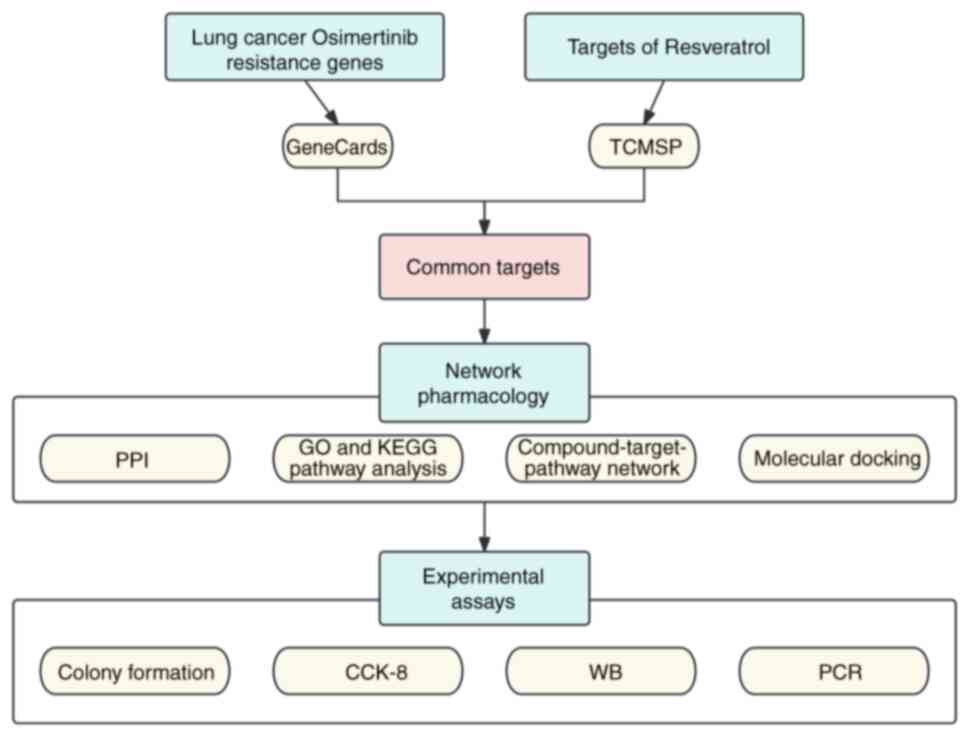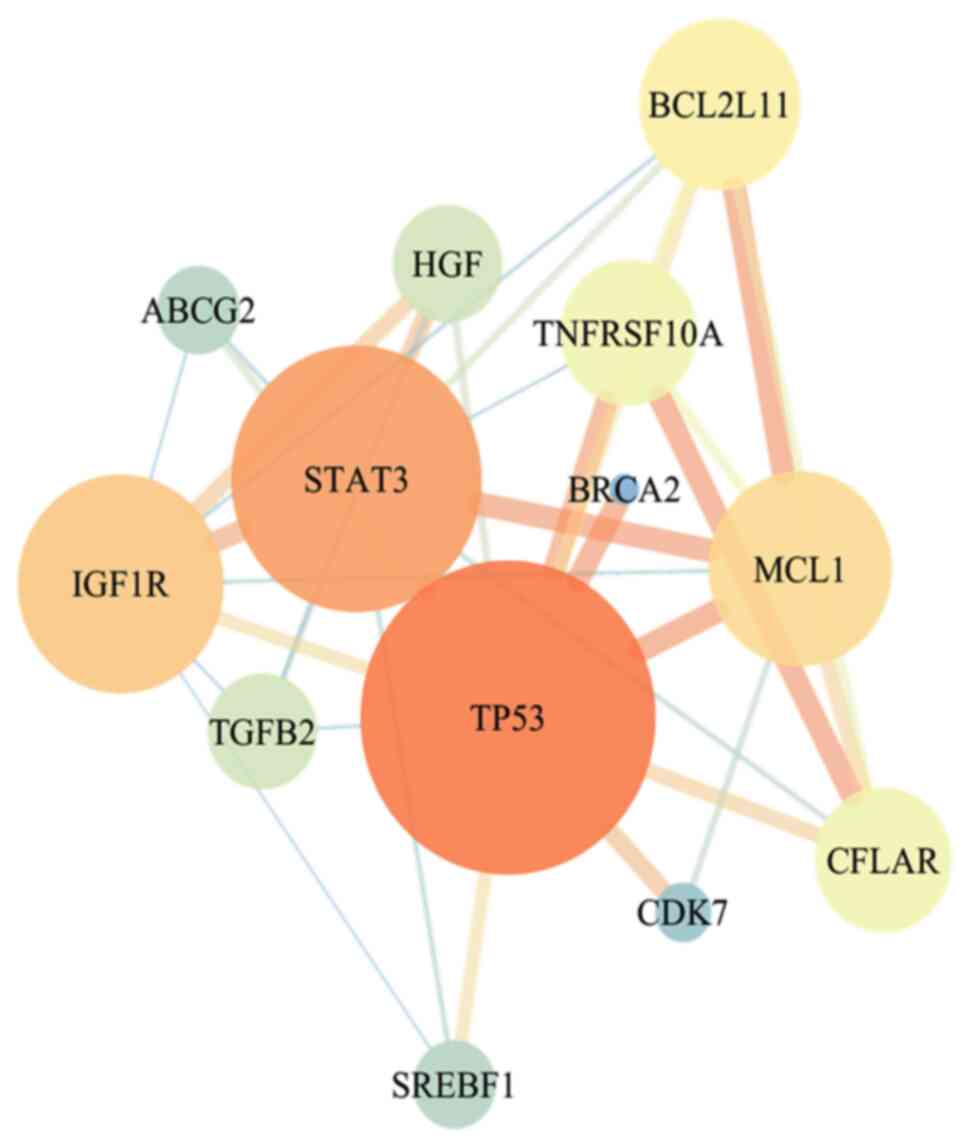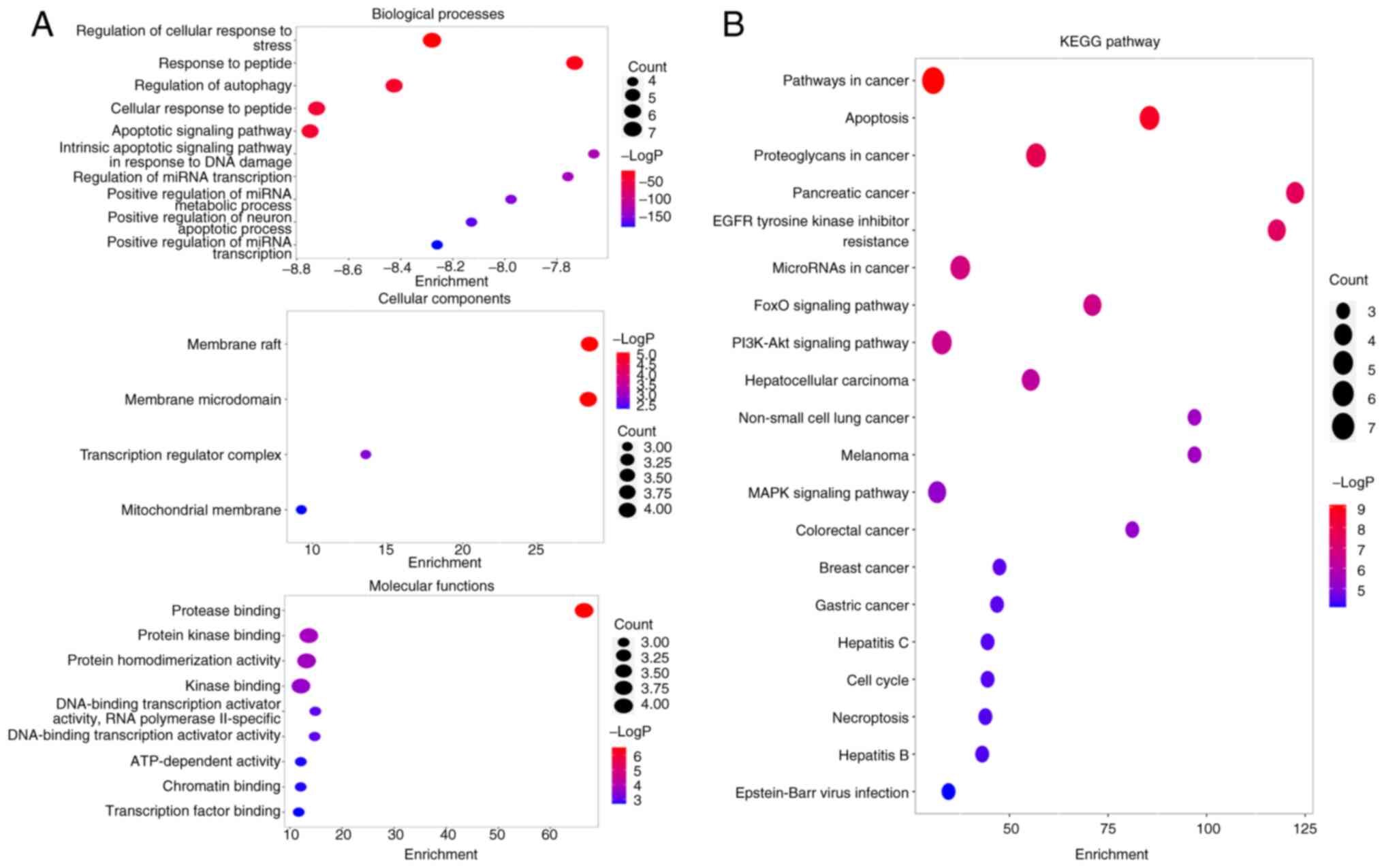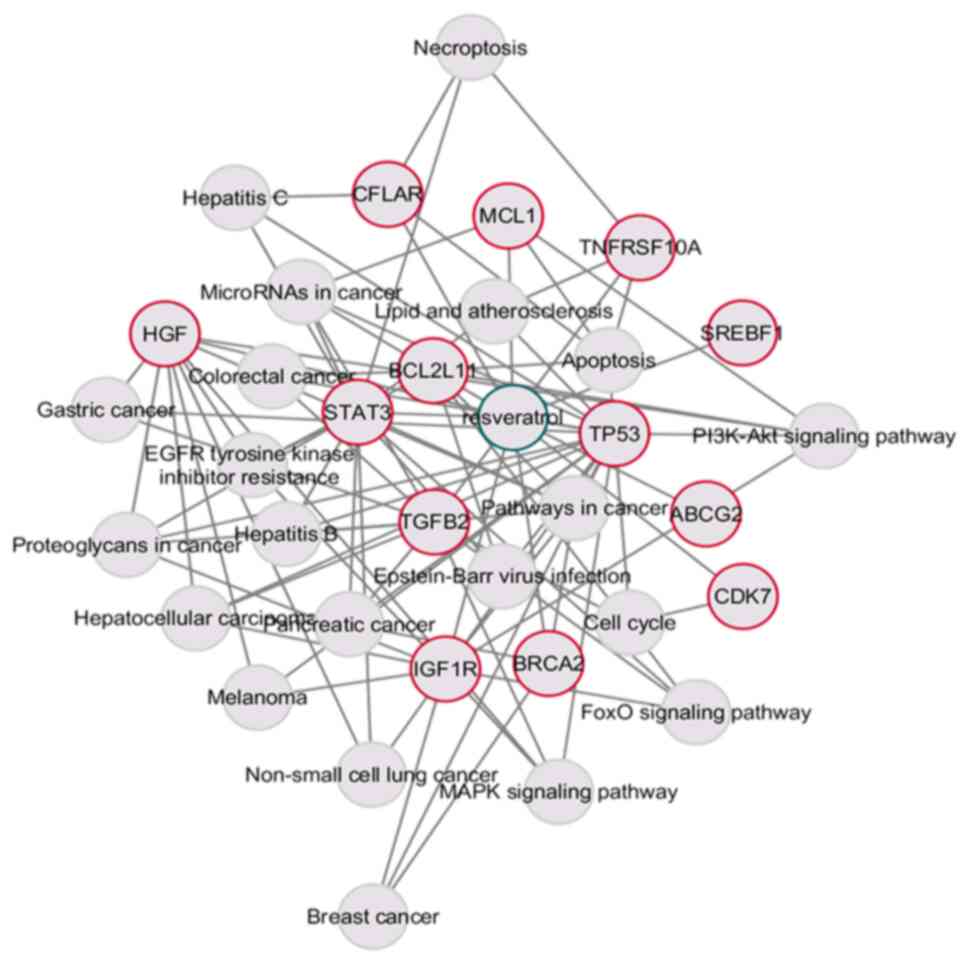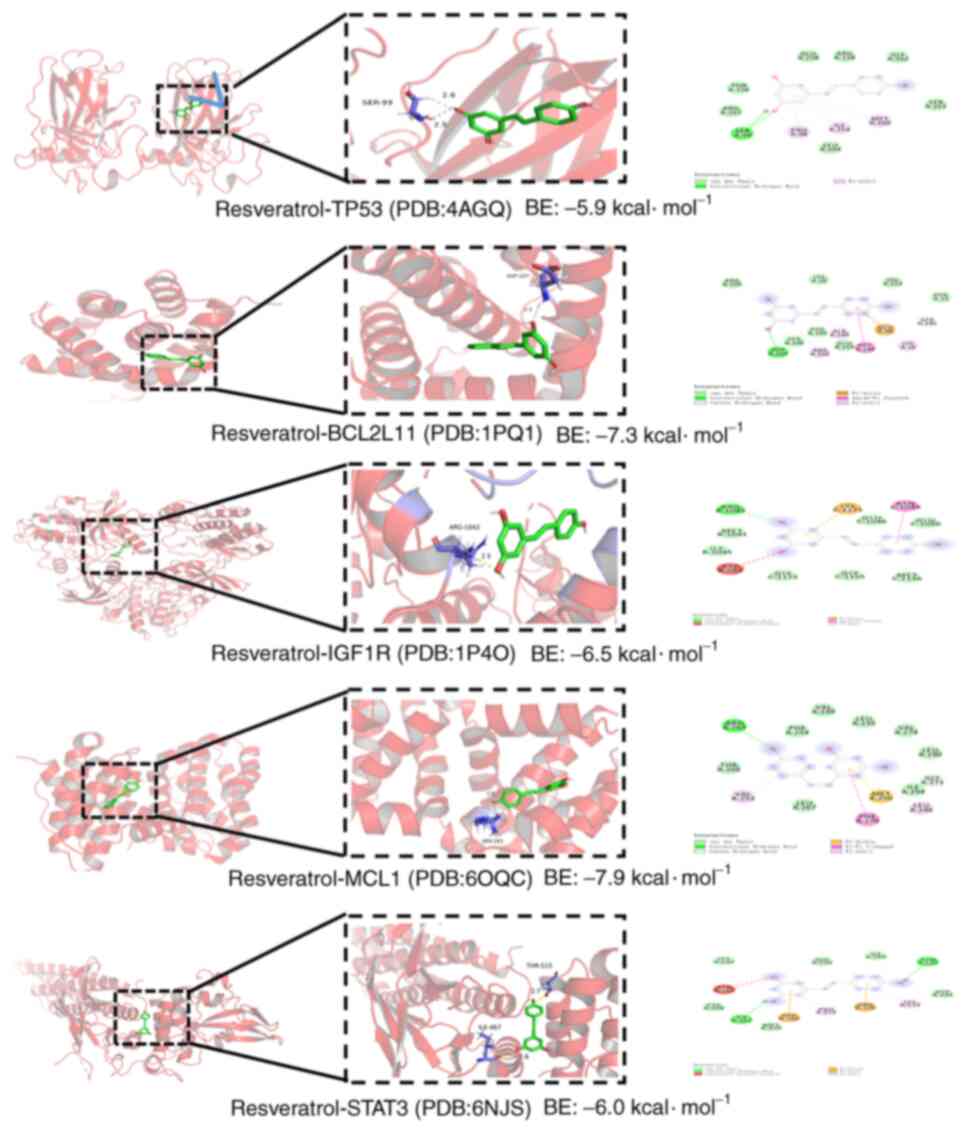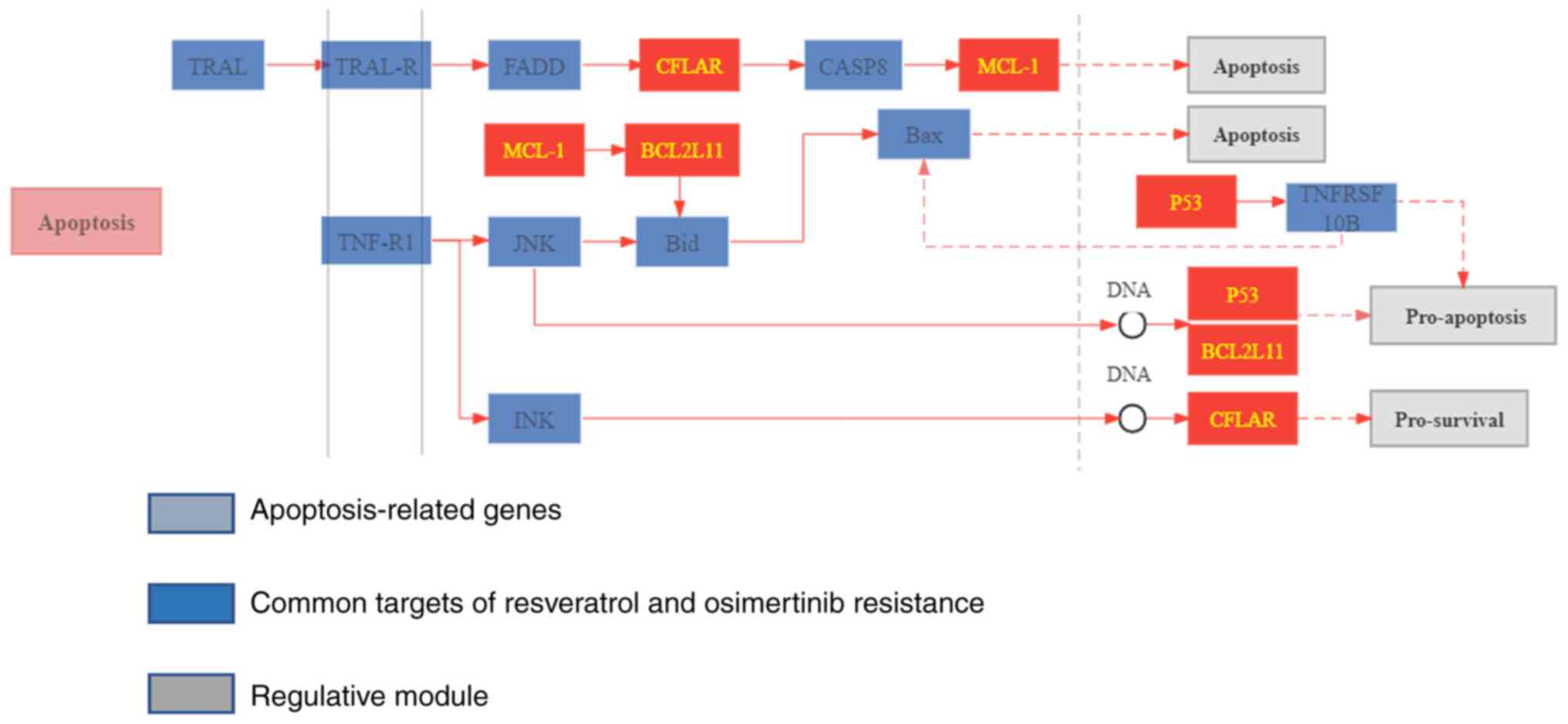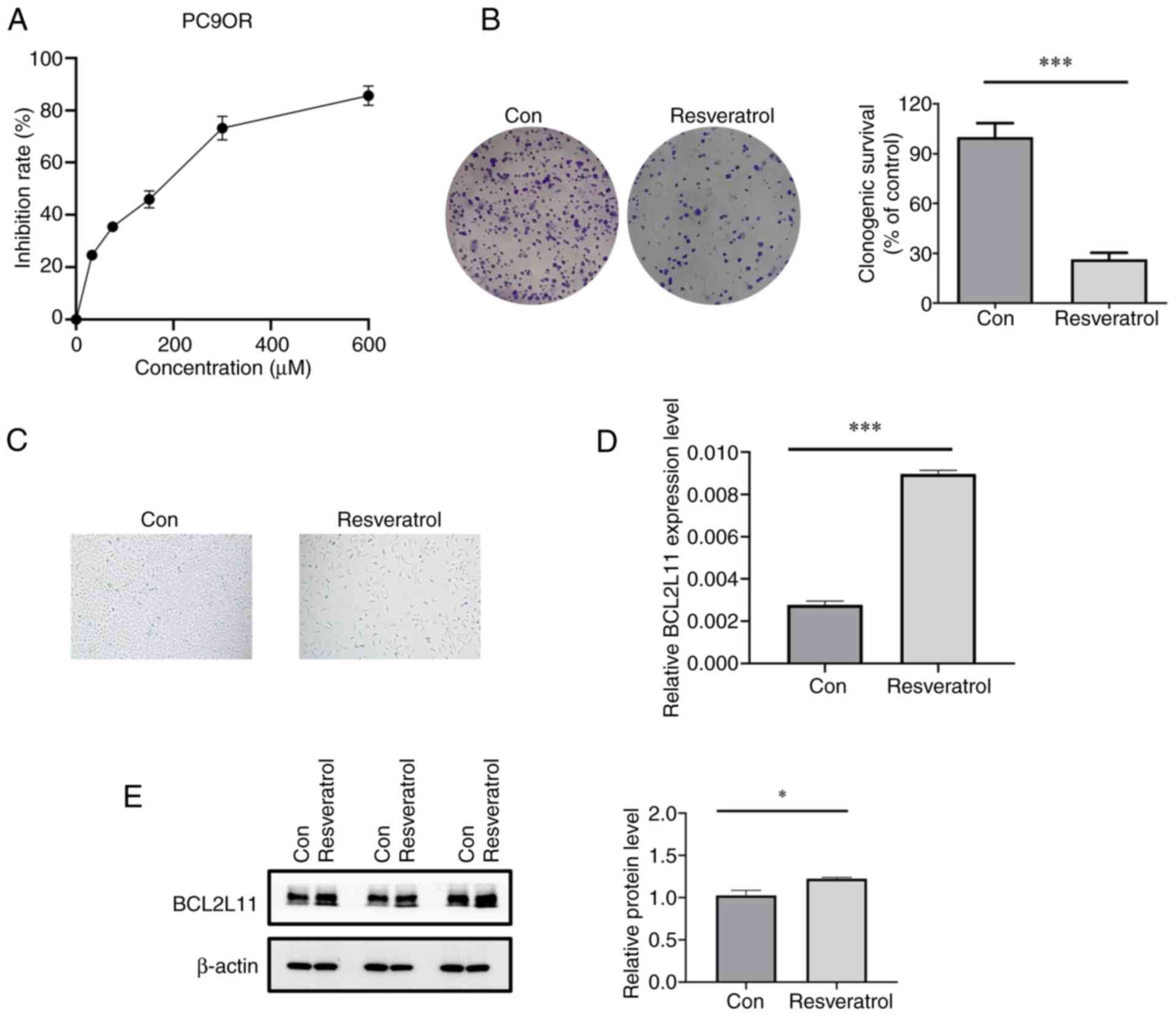|
1
|
Sung H, Ferlay J, Siegel RL, Laversanne M,
Soerjomataram I, Jemal A and Bray F: Global cancer statistics 2020:
GLOBOCAN estimates of incidence and mortality worldwide for 36
cancers in 185 countries. CA Cancer J Clin. 71:209–249. 2021.
View Article : Google Scholar : PubMed/NCBI
|
|
2
|
Siegel RL, Miller KD, Wagle NS and Jemal
A: Cancer statistics, 2023. CA Cancer J Clin. 73:17–48. 2023.
View Article : Google Scholar : PubMed/NCBI
|
|
3
|
Remon J, Steuer CE, Ramalingam SS and
Felip E: Osimertinib and other third-generation EGFR TKI in
EGFR-mutant NSCLC patients. Ann Oncol. 29 (Suppl_1):i20–i27. 2018.
View Article : Google Scholar : PubMed/NCBI
|
|
4
|
Leonetti A, Sharma S, Minari R, Perego P,
Giovannetti E and Tiseo M: Resistance mechanisms to osimertinib in
EGFR-mutated non-small cell lung cancer. Br J Cancer. 121:725–737.
2019. View Article : Google Scholar : PubMed/NCBI
|
|
5
|
Blaquier JB, Ortiz-Cuaran S, Ricciuti B,
Mezquita L, Cardona AF and Recondo G: Tackling osimertinib
resistance in EGFR-mutant Non-small cell lung cancer. Clin Cancer
Res. 29:3579–3591. 2023. View Article : Google Scholar : PubMed/NCBI
|
|
6
|
Wang Q, Yang S, Wang K and Sun SY: MET
inhibitors for targeted therapy of EGFR TKI-resistant lung cancer.
J Hematol Oncol. 12:632019. View Article : Google Scholar : PubMed/NCBI
|
|
7
|
Chaft JE, Shyr Y, Sepesi B and Forde PM:
Preoperative and postoperative systemic therapy for operable
Non-small-Cell lung cancer. J Clin Oncol. 40:546–555. 2022.
View Article : Google Scholar : PubMed/NCBI
|
|
8
|
Gomatou G, Syrigos N and Kotteas E:
Osimertinib resistance: Molecular mechanisms and emerging treatment
options. Cancers (Basel). 15:8412023. View Article : Google Scholar : PubMed/NCBI
|
|
9
|
Hartmaier RJ, Markovets AA, Ahn MJ,
Sequist LV, Han JY, Cho BC, Yu HA, Kim SW, Yang JC, Lee JS, et al:
Osimertinib + Savolitinib to overcome acquired MET-mediated
resistance in epidermal growth factor Receptor-mutated,
MET-amplified Non-small cell lung cancer: TATTON. Cancer Discov.
13:98–113. 2023. View Article : Google Scholar : PubMed/NCBI
|
|
10
|
Planchard D, Jänne PA, Cheng Y, Yang JC,
Yanagitani N, Kim SW, Kim SW, Sugawara S, Yu Y, Fan Y, et al:
Osimertinib with or without Chemotherapy in EGFR-mutated advanced
NSCLC. N Engl J Med. 389:1935–1948. 2023. View Article : Google Scholar : PubMed/NCBI
|
|
11
|
Wu L, Ke L, Zhang Z, Yu J and Meng X:
Development of EGFR TKIs and options to manage resistance of
Third-Generation EGFR TKI Osimertinib: Conventional ways and immune
checkpoint inhibitors. Front Oncol. 10:6027622020. View Article : Google Scholar : PubMed/NCBI
|
|
12
|
Vicencio JM, Evans R, Green R, An Z, Deng
J, Treacy C, Mustapha R, Monypenny J, Costoya C, Lawler K, et al:
Osimertinib and anti-HER3 combination therapy engages immune
dependent tumor toxicity via STING activation in trans. Cell Death
Dis. 13:2742022. View Article : Google Scholar : PubMed/NCBI
|
|
13
|
Cai X, Miao J, Sun R, Wang S, Molina-Vila
MA, Chaib I, Rosell R and Cao P: Dihydroartemisinin overcomes the
resistance to osimertinib in EGFR-mutant non-small-cell lung
cancer. Pharmacol Res. 170:1057012021. View Article : Google Scholar : PubMed/NCBI
|
|
14
|
Tan Q, Lin S, Zeng Y, Yao M, Liu K, Yuan
H, Liu C and Jiang G: Ginsenoside Rg3 attenuates the osimertinib
resistance by reducing the stemness of Non-small cell lung cancer
cells. Environ Toxicol. 35:643–651. 2020. View Article : Google Scholar : PubMed/NCBI
|
|
15
|
Rauf A, Imran M, Butt MS, Nadeem M, Peters
DG and Mubarak MS: Resveratrol as an Anti-cancer agent: A review.
Crit Rev Food Sci Nutr. 58:1428–1447. 2018. View Article : Google Scholar : PubMed/NCBI
|
|
16
|
Galiniak S, Aebisher D and
Bartusik-Aebisher D: Health benefits of resveratrol administration.
Acta Biochim Pol. 66:13–21. 2019.PubMed/NCBI
|
|
17
|
Ko JH, Sethi G, Um JY, Shanmugam MK,
Arfuso F, Kumar AP, Bishayee A and Ahn KS: The role of resveratrol
in cancer therapy. Int J Mol Sci. 18:25892017. View Article : Google Scholar : PubMed/NCBI
|
|
18
|
Hu Y, Li C, Li H, Li M and Shu X:
Resveratrol-mediated reversal of tumor Multi-drug resistance. Curr
Drug Metab. 15:703–710. 2014. View Article : Google Scholar : PubMed/NCBI
|
|
19
|
Kong F, Xie C, Zhao X, Zong X, Bu L, Zhang
B, Tian H and Ma S: Resveratrol regulates PINK1/Parkin-mediated
mitophagy via the lncRNA ZFAS1-miR-150-5p-PINK1 axis, and enhances
the antitumor activity of paclitaxel against non-small cell lung
cancer. Toxicol Res (Camb). 11:962–974. 2022. View Article : Google Scholar : PubMed/NCBI
|
|
20
|
Fan XX, Yao XJ, Xu SW, Wong VK, He JX,
Ding J, Xue WW, Mujtaba T, Michelangeli F, Huang M, et al:
(Z)3,4,5,4′-trans-tetramethoxystilbene, a new analogue of
resveratrol, inhibits gefitinb-resistant non-small cell lung cancer
via selectively elevating intracellular calcium level. Sci Rep.
5:163482015. View Article : Google Scholar : PubMed/NCBI
|
|
21
|
Hopkins AL: Network pharmacology: The next
paradigm in drug discovery. Nat Chem Biol. 4:682–690. 2008.
View Article : Google Scholar : PubMed/NCBI
|
|
22
|
Kibble M, Saarinen N, Tang J, Wennerberg
K, Mäkelä S and Aittokallio T: Network pharmacology applications to
map the unexplored target space and therapeutic potential of
natural products. Nat Prod Rep. 32:1249–1266. 2015. View Article : Google Scholar : PubMed/NCBI
|
|
23
|
Ru J, Li P, Wang J, Zhou W, Li B, Huang C,
Li P, Guo Z, Tao W, Yang Y, et al: Tcmsp: A database of systems
pharmacology for drug discovery from herbal medicines. J
Cheminform. 6:132014. View Article : Google Scholar : PubMed/NCBI
|
|
24
|
Stelzer G, Rosen N, Plaschkes I, Zimmerman
S, Twik M, Fishilevich S, Stein TI, Nudel R, Lieder I, Mazor Y, et
al: The GeneCards suite: From gene data mining to disease genome
sequence analyses. Curr Protoc Bioinformatics. 54:1–30. 2016.
View Article : Google Scholar : PubMed/NCBI
|
|
25
|
Consortium U and Dogan T: Uniprot: A
worldwide hub of protein knowledge. Nucleic Acids Res.
47:D506–D515. 2019. View Article : Google Scholar : PubMed/NCBI
|
|
26
|
Szklarczyk D, Gable AL, Lyon D, Junge A,
Wyder S, Huerta-Cepas J, Simonovic M, Doncheva NT, Morris JH, Bork
P, et al: STRING v11: Protein-protein association networks with
increased coverage, supporting functional discovery in Genome-wide
experimental datasets. Nucleic Acids Res. 47:D607–D613. 2019.
View Article : Google Scholar : PubMed/NCBI
|
|
27
|
Shannon P, Markiel A, Ozier O, Baliga NS,
Wang JT, Ramage D, Amin N, Schwikowski B and Ideker T: Cytoscape: A
software environment for integrated models of biomolecular
interaction networks. Genome Res. 13:2498–2504. 2003. View Article : Google Scholar : PubMed/NCBI
|
|
28
|
Zhou Y, Zhou B, Pache L, Chang M,
Khodabakhshi AH, Tanaseichuk O, Benner C and Chanda SK: Metascape
provides a Biologist-oriented resource for the analysis of
Systems-level datasets. Nat Commun. 10:15232019. View Article : Google Scholar : PubMed/NCBI
|
|
29
|
Hadley W: Ggplot2: Elegant Graphics for
Data Analysis. Springer-Verlag; New York: 2016
|
|
30
|
Kim S, Chen J, Cheng T, Gindulyte A, He J,
He S, Li Q, Shoemaker BA, Thiessen PA, Yu B, et al: PubChem 2023
update. Nucleic Acids Res. 51:D1373–D1380. 2023. View Article : Google Scholar : PubMed/NCBI
|
|
31
|
Wilcken R, Liu X, Zimmermann MO,
Rutherford TJ, Fersht AR, Joerger AC and Boeckler FM:
Halogen-enriched fragment libraries as leads for drug rescue of
mutant P53. J Am Chem Soc. 134:6810–6818. 2012. View Article : Google Scholar : PubMed/NCBI
|
|
32
|
Bai L, Zhou H, Xu R, Zhao Y, Chinnaswamy
K, McEachern D, Chen J, Yang CY, Liu Z, Wang M, et al: A potent and
selective Small-molecule degrader of STAT3 achieves complete tumor
regression in vivo. Cancer Cell. 36:498–511. 2019. View Article : Google Scholar : PubMed/NCBI
|
|
33
|
Munshi S, Hall DL, Kornienko M, Darke PL
and Kuo LC: Structure of apo, unactivated insulin-like growth
factor-1 receptor kinase at 1.5 A resolution. Acta Crystallogr D
Biol Crystallogr. 59:1725–1730. 2003. View Article : Google Scholar : PubMed/NCBI
|
|
34
|
Caenepeel S, Brown SP, Belmontes B, Moody
G, Keegan KS, Chui D, Whittington DA, Huang X, Poppe L, Cheng AC,
et al: AMG 176, a selective MCl1 inhibitor, is effective in
hematologic cancer models alone and in combination with established
therapies. Cancer Discov. 8:1582–1597. 2018. View Article : Google Scholar : PubMed/NCBI
|
|
35
|
Liu X, Dai S, Zhu Y, Marrack P and Kappler
JW: The structure of a Bcl-xL/Bim fragment complex: Implications
for Bim function. Immunity. 19:341–352. 2003. View Article : Google Scholar : PubMed/NCBI
|
|
36
|
Berman HM, Westbrook J, Feng Z, Gilliland
G, Bhat TN, Weissig H, Shindyalov IN and Bourne PE: The protein
data bank. Nucleic Acids Res. 28:235–242. 2000. View Article : Google Scholar : PubMed/NCBI
|
|
37
|
Sang S, Sun C, Ding R, Jiang J, Han Y, Gan
S, Bi L and Gong Y: Feiyanning formula modulates the molecular
mechanism of osimertinib resistance in lung cancer by regulating
the Wnt/β-catenin pathway. Front Pharmacol. 13:10194512022.
View Article : Google Scholar : PubMed/NCBI
|
|
38
|
Sununliganon L and Singhatanadgit W:
Highly osteogenic PDL stem cell clones specifically express
elevated levels of ICAM1, ITGB1 and TERT. Cytotechnology. 64:53–63.
2012. View Article : Google Scholar : PubMed/NCBI
|
|
39
|
Livak KJ and Schmittgen TD: Analysis of
relative gene expression data using real-time quantitative PCR and
the 2(−Delta Delta C(T)) method. Methods. 25:402–408. 2001.
View Article : Google Scholar : PubMed/NCBI
|
|
40
|
Yang AY, Liu HL and Yang YF: Study on the
mechanism of action of Scutellaria barbata on hepatocellular
carcinoma based on network pharmacology and bioinformatics. Front
Pharmacol. 13:10725472022. View Article : Google Scholar : PubMed/NCBI
|
|
41
|
Fu K, Xie F, Wang F and Fu L: Therapeutic
strategies for EGFR-mutated Non-small cell lung cancer patients
with osimertinib resistance. J Hematol Oncol. 15:1732022.
View Article : Google Scholar : PubMed/NCBI
|
|
42
|
Xin R, Shen B, Huang ZY, Liu JB, Li S,
Jiang GX, Zhang J, Cao YH, Zou DZ, Li W, et al: Research progress
in elucidating the mechanisms underlying resveratrol action on lung
cancer. Curr Pharm Biotechnol. 24:427–437. 2023. View Article : Google Scholar : PubMed/NCBI
|
|
43
|
Meng T, Xiao D, Muhammed A, Deng J, Chen L
and He J: Anti-inflammatory action and mechanisms of resveratrol.
Molecules. 26:2292021. View Article : Google Scholar : PubMed/NCBI
|
|
44
|
Chupradit S, Bokov D, Zamanian MY, Heidari
M and Hakimizadeh E: Hepatoprotective and therapeutic effects of
resveratrol: A focus on Anti-inflammatory and antioxidative
activities. Fundam Clin Pharmacol. 36:468–485. 2022. View Article : Google Scholar : PubMed/NCBI
|
|
45
|
Delmas D, Solary E and Latruffe N:
Resveratrol, a phytochemical inducer of multiple cell death
pathways: Apoptosis, autophagy and mitotic catastrophe. Curr Med
Chem. 18:1100–1121. 2011. View Article : Google Scholar : PubMed/NCBI
|
|
46
|
Maleki DP, Sadoughi F, Asemi Z and Yousefi
B: The role of polyphenols in overcoming cancer drug resistance: A
comprehensive review. Cell Mol Biol Lett. 27:12022. View Article : Google Scholar : PubMed/NCBI
|
|
47
|
Borska S, Pedziwiatr M, Danielewicz M,
Nowinska K, Pula B, Drag-Zalesinska M, Olbromski M, Gomulkiewicz A
and Dziegiel P: Classical and atypical resistance of cancer cells
as a target for resveratrol. Oncol Rep. 36:1562–1568. 2016.
View Article : Google Scholar : PubMed/NCBI
|
|
48
|
Liping Y, Jian H, Zhenchao T, Yan Z, Jing
Y, Yangyang Z, Jing G and Liting Q: GSH-responsive poly-resveratrol
based nanoparticles for effective drug delivery and reversing
multidrug resistance. Drug Deliv. 29:229–237. 2022. View Article : Google Scholar : PubMed/NCBI
|
|
49
|
Hetts SW: To die or not to die: An
overview of apoptosis and its role in disease. JAMA. 279:300–307.
1998. View Article : Google Scholar : PubMed/NCBI
|
|
50
|
Pore MM, Hiltermann TJ and Kruyt FA:
Targeting apoptosis pathways in lung cancer. Cancer Lett.
332:359–368. 2013. View Article : Google Scholar : PubMed/NCBI
|
|
51
|
Han SW and Roman J: Targeting apoptotic
signaling pathways in human lung cancer. Curr Cancer Drug Targets.
10:566–574. 2010. View Article : Google Scholar : PubMed/NCBI
|
|
52
|
Mohammad RM, Muqbil I, Lowe L, Yedjou C,
Hsu HY, Lin LT, Siegelin MD, Fimognari C, Kumar NB, Dou QP, et al:
Broad targeting of resistance to apoptosis in cancer. Semin Cancer
Biol. 35 (Suppl):S78–S103. 2015. View Article : Google Scholar : PubMed/NCBI
|
|
53
|
Carneiro BA and El-Deiry WS: Targeting
apoptosis in cancer therapy. Nat Rev Clin Oncol. 17:395–417. 2020.
View Article : Google Scholar : PubMed/NCBI
|
|
54
|
Hickman JA: Apoptosis and chemotherapy
resistance. Eur J Cancer. 32A:921–926. 1996. View Article : Google Scholar : PubMed/NCBI
|
|
55
|
Zhang L, Lu Z and Zhao X: Targeting Bcl-2
for cancer therapy. Biochim Biophys Acta Rev Cancer.
1876:1885692021. View Article : Google Scholar : PubMed/NCBI
|
|
56
|
Gillings AS, Balmanno K, Wiggins CM,
Johnson M and Cook SJ: Apoptosis and autophagy: BIM as a mediator
of tumour cell death in response to oncogene-targeted therapeutics.
Febs J. 276:6050–6062. 2009. View Article : Google Scholar : PubMed/NCBI
|
|
57
|
Nieters A, Conde L, Slager SL,
Brooks-Wilson A, Morton L, Skibola DR, Novak AJ, Riby J, Ansell SM,
Halperin E, et al: PRRC2A and BCL2L11 gene variants influence risk
of non-Hodgkin lymphoma: Results from the InterLymph consortium.
Blood. 120:4645–468. 2012. View Article : Google Scholar : PubMed/NCBI
|
|
58
|
Huang L and Fu L: Mechanisms of resistance
to EGFR tyrosine kinase inhibitors. Acta Pharm Sin B. 5:390–340.
2015. View Article : Google Scholar : PubMed/NCBI
|
|
59
|
Li H, Zhou S, Li X, Wang D, Wang Y, Zhou C
and Schmid-Bindert G: Gefitinib-resistance is related to BIM
expression in non-small cell lung cancer cell lines. Cancer Biother
Radiopharm. 28:115–1123. 2013.PubMed/NCBI
|















